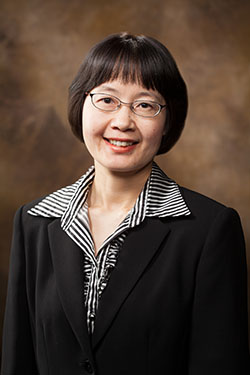NSF Grant to Help Researchers Develop Protective Material for Electronics
FAYETTEVILLE, Ark. – Engineering researchers at the University of Arkansas have received a $438,317 grant from the National Science Foundation to identify and characterize the fundamental mechanisms of a novel, core-shell nano-scale structure.
Discovered by Min Zou, professor of mechanical engineering, the core-shell structure is a new type of material that can be used to improve the mechanical integrity of electro-mechanical systems in computer hard-drive discs and a wide range of other electronics devices.
“Core-shell nanostructures have many novel properties – optical, magnetic and catalytic,” Zou said. “Recently, my group discovered that these structures also have novel mechanical properties – unusually high strength and deformation resistance, for example – and thus can be incorporated into solid surfaces for many applications where mechanical integrity of nanostructures is of paramount importance.”
Nano-scale core-shell structures also function as a friction-reduction material. The project focuses on using them to texture the surface of micro- and nano-scale electro-mechanical systems and computer hard drives to reduce friction between contacting surfaces. The textures can also be used to enhance water-repellency of surfaces for self-cleaning and anti-corrosion applications and to facilitate cell growth in tissue engineering.
The core-shell structure Zou discovered consists of a nano-scale metallic core covered by a hard, amorphous shell made of a different type of nano-scale material. The structure is unique in that it holds its shape after being subjected to extremely high, normal and shear contact stress. It also demonstrates much higher yield strength than either its core material or shell material had alone.
To gain a fundamental understanding of the mechanical behavior of the core-shell structure, Zou will collaborate with Douglas Spearot, associate professor of mechanical engineering, and Arun Nair, assistant professor of mechanical engineering. Spearot and Nair both have atomistic and multi-scale modeling expertise. Together, the team will:
- Perform nano-indentation experiments to study the effects of core and shell materials, core size and micro-structure, shell thickness and core/shell volume ratio
- Develop and validate molecular dynamics and multi-scale simulation models to understand the role of the core/shell interface
- Develop computational models to gain a fundamental understanding of the space and parameters of the core/shell structure to ensure optimal performance.
Zou’s research focuses on nano-surface engineering, nano-mechanics and tribology, the study of friction. In a different research project, she and her research team significantly reduced wear of polytetrafluoroethylene — otherwise known as Teflon, the brand name used by the chemical company DuPont — by treating the low friction material with silica nanoparticles.
A year ago, Zou became a fellow in the Society of Tribologists and Lubrication Engineers. Founded in 1944, the Society of Tribologists and Lubrication Engineers is the premier technical society for the fields of tribology and lubrication engineering.
Zou and Spearot each hold a 21st Century Professorship in Mechanical Engineering.
About the University of Arkansas: The University of Arkansas provides an internationally competitive education for undergraduate and graduate students in more than 200 academic programs. The university contributes new knowledge, economic development, basic and applied research, and creative activity while also providing service to academic and professional disciplines. The Carnegie Foundation classifies the University of Arkansas among only 2 percent of universities in America that have the highest level of research activity. U.S. News & World Report ranks the University of Arkansas among its top American public research universities. Founded in 1871, the University of Arkansas comprises 10 colleges and schools and maintains a low student-to-faculty ratio that promotes personal attention and close mentoring.
Contacts
Min Zou, professor, Department of Mechanical Engineering
College of Engineering
479-575-6671, mzou@uark.edu
Douglas Spearot, associate professor, Department of Mechanical Engineering
College of Engineering
479-575-3040, dspearot@uark.edu
Matt McGowan, science and research communications officer
University Relations
479-575-4246, dmcgowa@uark.edu
